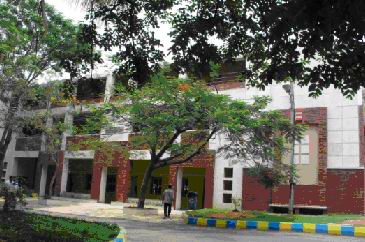|


INDUSTRIAL ENGINEERING YOUTH ACADEMY (INDRIYA)
Department of Industrial Engineering & Management,
Dayananda Sagar College of Engineering, Bangalore-78
Welcome
INSTITUTION
The founder of the Dayananda Sagar Institution, Barrister R Dayananda Sagar who was an active participant of freedom movement was an educationist and social worker . . He had the greatest vision of propagating education from primary school level to higher education with a motto "EDUCATION COMPLETES A MAN" and "KNOWLEDGE EMPOWERS".Mahatma Gandhi Vidya Peeta Trust was established in the year 1962 to fulfill his dream of providing formal education to all. It has become a household name in exceptional commitment to societal welfare and serves as a cradle for nurturing education from primary level to professional courses. Today the Trust manages several educational institutions of repute. His long-term vision has been successful and greater heights have been achieved by his sons Dr. D. Hemachandra Sagar & Dr. D. Premachandra Sagar.
The Dayananda Sagar College of Engineering spread over in an area of 27 acres, is affiliated to VISVESVARAYA TECHNOLOGICAL UNIVERSITY (VTU) has been approved by the Government bodies and AICTE. The college is situated in the heart of Garden City Bangalore, also known as the Silicon Valley of India. Bangalore is one of the most important cities in India enjoying a salubrious weather, is at 902 m altitude, 120 57' N,and 770 38' E, is well connected with all principalcities of India by road, rail, and air.The college enjoys the reputation and takesadvantage of the fact that the city is the nerve center for Information Technology,Aerospace Technology, many electronic industries ofrepute, and defense establishments which have helpedthe institute in both professional and academic growth.
The Dayananda Sagar College of Engineering was established under MGVP Trust during 1979 - 1980, offering courses under Civil, Mechanical, Electrical and Electronics Engineering catering to the demands of industries, and today offers eleven undergraduate programs leading to award of Bachelors degree of the VTU.
The college started with the following four branches with effect from October 3, 1979:
Civil-Engineering
Mechanical-Engineering
Electrical-Engineering
Electronics & Communication Engineering
Later on, additional branches were introduced as follows:
- 1982-Industrial Engineering and Management & Chemical Engineering
- 1986-Computer Science & Engineering
- 1991-Telecommunication Engineering Architecture
- 1992-Instrumentation Technology, Information Science and Engineering
- 1996-Medical Electronics
|
 |
COLLEGE ADMINISTRATION:- CHAIRMAN : Dr.D.Hemachandra Sagar
- VICE-CHAIRMAN : Dr.D.Premachandra Sagar
- SECRETARIES : Sri.Galiswamy & Sri. H.Balachandra
- PRINCIPAL : Dr.Nethaji S Ganesan
- Vice-Principal: Dr.Sampoorna Naidu
VISION
"To strive at creating the institution as a
center of highest caliber learning, so as to create
an overall intellectual atmosphere with each deriving
strength from the other to be the best of undergraduate
engineers, scientists and mathematicians". MISSION
"To serve its region, state, the nation and globally by
preparing students to make meaningful contributions in an increasingly complex global society, by encouraging reflection on and evaluation of emerging needs and priorities, and by supporting research and service that enhance technological, health, economic human and cultural development". QUALITY POLICY
We, at DAYANANDA SAGAR COLLEGE OF ENGINEERTING are committed to continually improve and deliver
competitive quality technical education
to the utmost satisfaction of students, their parents and potential employers. AIM OF DSCE Creating an environment to develop younger generation of Indian citizens with values, discipline, patriotism and commitment to the society by providing quality professional engineering education at under-graduate level to all spectra of the society at an affordable cost.
DEPARTMENT OF INDUSTRIAL ENGINEERING & MANAGEMENT
MISSION OF THE DEPARTMENT
- Creating a sound academic environment for students & teachers to update their knowledge
with excellent ambience of teaching learning process.
- Continuous curriculum development and faculty development.
- Industry institute interaction in the form of faculty exchange, projects, workshops and seminars.
- Developing human relations and social engineering for students in the form of
extra curricular & co-curricular activities.
OBJECTIVES OF THE DEPARTMENT
- To improve teaching learning process by use of teaching aids and developing course materials.
- Continuous faculty development programs in the form of QIP and summer schools.
- Continuous up gradation of infra structural facilities keeping in tune with the technical
advancement & change of curricula.
- Develop and update laboratory experiments and manuals for students' exposure to
hands on experience of industrial life.
- Develop students' academy to carry out co-curricular & extra-curricular activities of
counselling, industrial visits/tours and talent search.
- To establish the department as a formal industry-institute interface by conducting
students & staff seminars,
conferences & workshops and taking up consultancy projects.
We are glad to inform you all that our department of IEM has beed accredited for 3 years by National Board of Accreditation (NBA), AICTE, New Delhi from July 2005. The department has also received permanent affiliation for 5 years from VTU. We express our thanks to management, students, staff, parents, alumni and employers for thier continued cooperation and support.
THE VISION OF AN INDUSTRIAL ENGINEER The Eye stands for Total Observation
The Clock symbolizes Time Optimization
The triangles represent sensory organs
Like eyes, ears, nose and tounge. Eyes Observing everything, missing nothing
Ears ever open to complaints and suggestions
Nose which can smell and spot troubles
Tounge endowed with a 'Gift of the gab'. The eyeball stands for focus
As sharp as the milling cutter
After all, it is the vision that leads
our mission of TQM, now and for ever.
The students and staff of the department jointly run a club
INDRIYA (Industrial Engineering Youth Academy).
WE TEACH..., WE LEARN..., WE CARE... The Academy has the following activities: 1. Curricular activities : Library : Collection of books, notes, journals/magazines,
Question papers, educational CDs, films, project reports, softwares. Projects: student seminars, appraisal system. Alumni- Data bank, meets. Placements- Career guidance.
Co-curricular activities :
Industrial visits, invited talks, seminars, workshops, management fests, paper presentations/publishing, activities of chapters of professional bodies like IIIE, ORSI, BMA.
Entrepreneurship development programs. Extra curricular activities :
Excursions, cultural & literary talent search, social service activities & sports.
|
 |
|